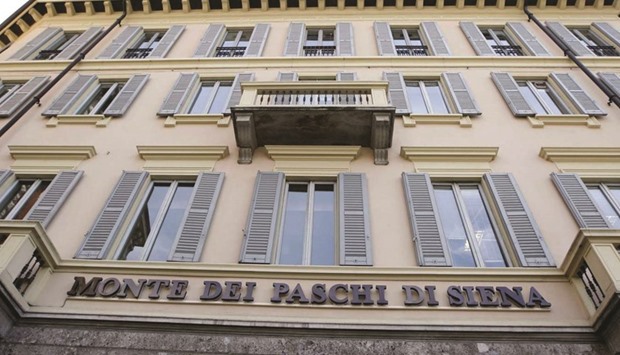A €5bn ($5.33bn) rescue plan for Italian bank Monte dei Paschi di Siena hung by a thread yesterday after Prime Minister Matteo Renzi’s heavy defeat at a weekend referendum tipped the country into political turmoil.
The bank, saddled with bad loans, needs to raise the money by the end of the month to avoid being wound down, but Italy now faces early elections after Renzi said he would quit to take responsibility for the defeat of his constitutional referendum.
Monte dei Paschi, rated the weakest lender in European stress tests this summer, had planned to secure a firm commitment from one or more anchor investors and launch a share sale as early tomorrow or Thursday.
The lender’s shares fluctuated wildly in early trade yesterday, with investment banks due to meet at around 1100 GMT to decide whether to back the cash call.
Under a pre-underwriting deal, they can drop the transaction due to adverse market conditions.
The bank’s board was expected to convene today.
Renzi announced he would step down in the early hours of yesterday after his constitutional reform was rejected by 59.1% of voters, a wider margin that had been expected.
Italian government bonds and shares fell sharply early yesterday, as investors worried that instability in the eurozone’s third-largest economy could reignite a dormant financial crisis and deal a hammer blow to the country’s fragile banking sector.
However, by mid-morning stocks had pared losses and Monte dei Paschi was down just 0.1% having earlier shed as much as 10%. Intesa Sanpaolo rose 2% after earlier falling around 5%, while UniCredit shed 0.4% having earlier dropped as much as 6%.
“We believe the ‘No’ vote makes it more difficult for Monte dei Paschi to find an anchor investor.
Based on the size and valuation of the capital increase needed, the challenge looks sizable,” Morgan Stanley analysts said in a note.
If Monte dei Paschi’s plan fails, the Italian government is expected to step in and pump public money into the bank to avoid a crisis, bankers and European officials said.
This would entail losses for the bank’s subordinated bondholders in line with tough European bank crisis rules — something Renzi’s government had sought to avoid at all costs.
It was not immediately clear to what extent retail investors, who hold €2.1bn of the bank’s junior debt, could be spared in the event of a state rescue.
Even at the height of the eurozone’s debt crisis, Italy had resisted calls to inject public money into its banks or ask for a EU bailout.
But it is running out of private solutions to cure the sector, which is burdened by €360bn of bad loans accumulated during a harsh recession.
Italy’s €4.25bn Atlas fund, hastily created this year to help channel private funds into struggling banks, has seen its coffers dry up as banking crises mushroom around it.
Two banks from the Veneto region that were rescued with a €2.5bn capital injection by the fund in the spring need another €2.5bn in fresh capital soon, analysts say.
And four small lenders bailed out by healthier banks last year also need more money to clean up their balance sheets.

If Monte dei Paschi’s plan fails, the Italian government is expected to step in and pump public money into the bank to avoid a crisis, say bankers and European officials.
